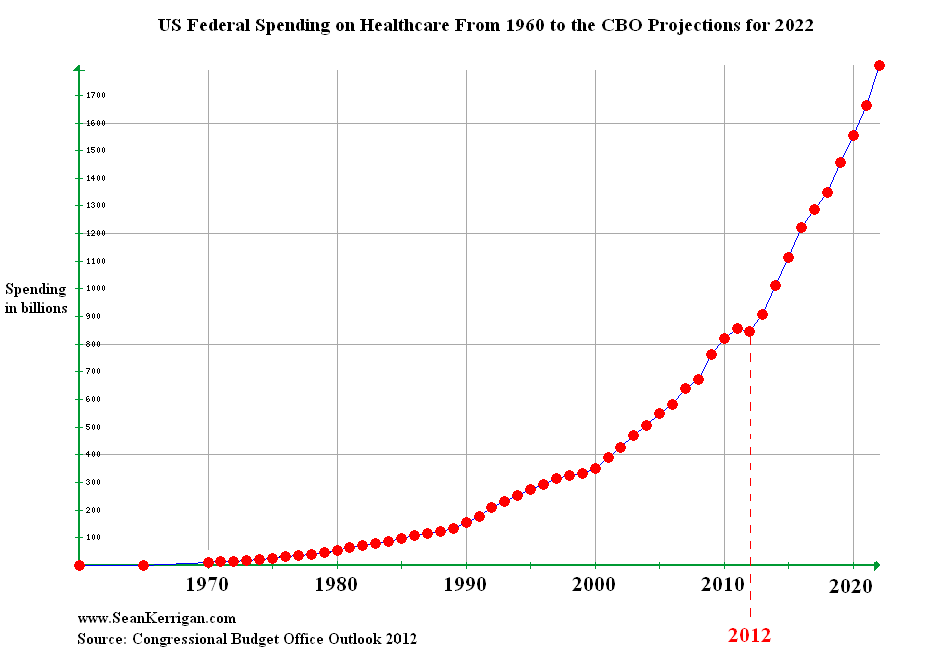Indeed it is and it will take with it any sucker foolish enough to enter the industry. Like the housing bubble and the dot-com boom, its collapse goes against all conventional and establishment thinking, but it’s an easy call to make if you examine the evidence.
At first, the industry looks healthy, robust and likely to expand well into the future. According to a recent report by Georgetown University, healthcare demand is expected to grow twice as fast as the rest of the economy. They predict jobs in the industry will make up 13 percent of all jobs in the US. They say the government will spend one out of every five dollars on healthcare. The study says much of the growth will come from robust demand from aging Baby Boomers.
You can hear it now. “That’s quite a growth trend! Why, I should tell my son or daughter about this so they can run head first into this high paying industry!” There’s only one problem with the school’s analysis. It’s a fiction based on erroneous projections.
The healthcare industry is a bubble. Not “maybe.” It is. This bubble, like most bubbles in our recent history, is being sustained by massive amounts of government manipulation, corruption and of course spending. Take away the stimulus and the entire system collapses. The study’s authors assume spending will continue to increase without interruption. To illustrate how absurd this thinking is, we’ve taken the liberty of graphing the Congressional Budget Office’s (CBO) healthcare spending projections.
(For the record, this chart does not account for inflation, but using the CBO’s projected inflation rate of roughly 2 percent a year would still produce a similar, nearly identical curve since spending is increasing at a much faster rate.)
We’ve mentioned the unsustainability of the governments spending projections before, but its worth repeating. According to the CBO’s own numbers, we will double the amount we spend on healthcare in the next seven years. Since we currently spend about as much on healthcare as we do the Pentagon, it would be like funding a whole second military.
Even more stunning is the revelation that between 2013 and 2017, the CBO projects we will spend $5.5 trillion on healthcare. That’s almost four times the cost of the wars in Afghanistan and Iraq combined!
Healthcare spending is a sacred cow in America. While spending is widely regarded as out of control, politicians continue to demagogue each other, claiming the other side wants to “destroy Medicare.” Their refusal to dramatically reform or dismantle the existing system has resulted is greater spending every year — good for the power elite in the short term, but like the housing bubble it will eventually doom Medicare and the industry as a whole.
While manipulation of the bond market has kept yields low, it remains to be seen how long the government’s borrowing can continue without consequence. To suggest that the government can double the amount it spends on healthcare without growing the non-government economy significantly is ludicrous. Without changes, the spending will result in a crisis which will force Medicare’s collapse. No amount of political will power will be able to stop it.
As for people planning to enter the field, I would suggest you seriously reconsider. The healthcare industry currently relies on government spending to sustain itself. Without the $850 billion a year the government currently spends on healthcare, it won’t matter how many Baby Boomers need to be taken care of; if the money isn’t there, there’s no demand.
The result will be an industry wide meltdown — although we certainly expect the whole country will likely be in a state of severe financial distress to say the least. Jobs and wages will be cut. New openings will be scarce and will almost certainly favor experienced care-givers over recent graduates.
We give Georgetown University some credit. The report does admit, their projections are based on “current trends.” They ask:
“Given that per capita spending on health care is higher in the U.S. than in any other developed country ($8,087, which translates into 18 percent of GDP), can healthcare’s share of GDP continue to grow?… With the public paying a growing percentage of healthcare costs at the same time that there is growing concern about the national debt and the size of government, healthcare is certain to fall under intense scrutiny.”
So basically they’re saying the report is largely invalid and will likely not come to pass. This raises the question, why produce a projection that has no possibility of becoming a reality? We could ask the same thing of the CBO. The two reports are probably more or less accurate up until some inevitable external factor interrupts the money flow.
Regardless, getting a degree in nursing or other health related field would be the rough equivalent of buying a house in 2006. Its not necessarily a bad decision if you really want to do it and are fortunate enough to find a job, but as a financial investment, its incredibly self-destructive.
For more, we recommend listening to this interview with market analyst Karl Denninger.
(Editor’s Note: The recent ruling on Obamacare will not effect this outcome in any way.)


